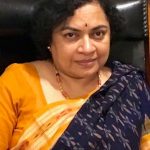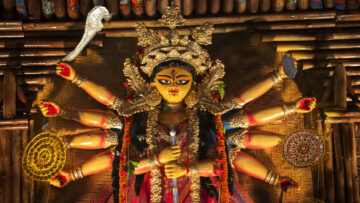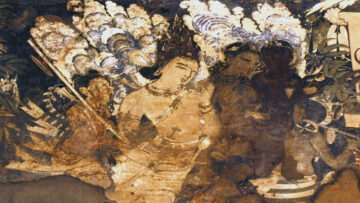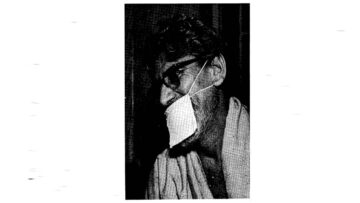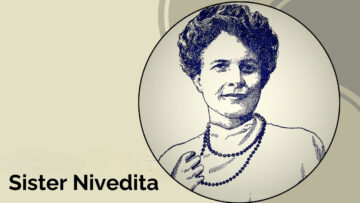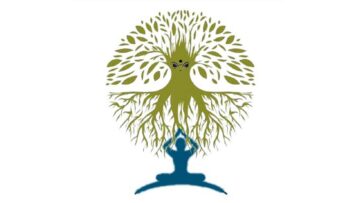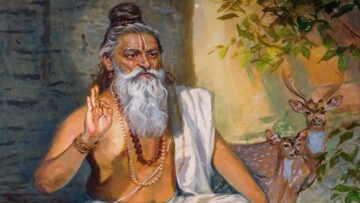Sage Vasistha instructed Rama in statecraft and archery. He also taught his pupil the precepts of Yoga by telling him many stories, which are contained in Yoga Vasistha. One such story was about Choodala, the queen of Malwa, who attained jnana[1] and became a Yogini while living amidst immense wealth and power. She became her husband´s Guru and led him towards spiritual emancipation.
Vasistha said, “Rama, I must tell you the story of Sikhidhwaja and Choodala. They lived a life of equanimity and renunciation amid opulence and ruled their country with utmost diligence, but they were untouched by the highs and lows of success and failure while performing their duty. They led a life of exemplary divine love.”
He continued, “Prince Sikhidhwaja lost his father when he was very young but managed to assert his sovereignty and rule Malwa from Ujjain, his capital, with the help of his ministers.
“Sikhidhwaja married Choodala, the beautiful princess of Saurashta. Choodala was as accomplished as she was beautiful. Sikhidhwaja and Choodala were utterly devoted to each other. The kingdom ran like clockwork. Choodala was Sikhidwaja’s helpmeet in every way. They were perfectly attuned and understood each other without speaking. Sikhidwaja learned music and dancing from his wife. He instructed her in drawing and dharmashastra[2]. Neither had noticed the years passing by, and suddenly, it seemed they had nothing much to say to each other.
The ennui of middle age had set in.
“Pleasures are transient. We must find that something having attained which we are never sorrowful,” they thought and started pursuing higher knowledge.
Choodala became highly introspective and started reflecting upon the fundamental questions of life: “Who am I? How is it that I am so deluded that I cannot answer this basic question? I am not my inert, decaying physical body. I only experience my body through my thoughts in my manas[3]. My limbs work because my mind commands them. My mind commands my sense organs as well. But then, my mind is inert, too! Because it is driven by my buddhi[4], intellect, which evaluates and analyses. But even my intellect is inert because it is driven by ahamkara[5]. But even the ego is inert, because it is conjured by jiva[6], the individual being. Jiva is pure consciousness…”
After much contemplation, Choodala realized, “I am pure consciousness, that which is known by various names like Brahman, atman. I am all-pervading, devoid of ahankara. This consciousness is not subject to the cycle of birth and death. It is not subject to destruction! I, who see is not different from what I see! There is no duality here!”
Choodala had attained supreme bliss. She was free of attachments even while living everyday life. Without abandoning or seeking anything, she dealt with everything naturally and spontaneously. Her questions had been resolved. Her mind was at rest. She looked radiant, and her face practically glowed.
Meanwhile, Sikhidhwaja busied himself with studies and Sadhana[7].
Oppressed by care and boredom, Sikhidhwaja had not paid much mind to anything. But he noticed her glow one day and said, “My lovely wife! It seems like you are in the second flush of youth! What do you do to keep looking so young and beautiful?”
Choodala knew her husband was teasing her, but she answered seriously. “No, I have not gained knowledge of any new mantra. I have realized that I am not my body; I am Brahman. With this realization, I am always content. I stay detached even while I am enjoying sensual pleasures. I know what the mind and senses grasp is not true, and only the consciousness that pervades the universe is real. And because I stand firm in this realization, I am ever fresh and happy.”
Sikhidhwaja was annoyed. Was Choodala serious? Was his perception skewed? Or perhaps she was too arrogant! He smiled. “O, my innocent wife! You know it is easy to be joyous when enjoying pleasures of every kind! Can you be happy if you give up good food, dress, and service? Princess! Stop this pretence! There is nothing wrong with enjoying sensual pleasures. So, own up to it!”
Choodala felt sad that her husband had not understood her. But there was nothing she could do, and she decided to wait and went about her work as usual.
By then, Choodala was an advanced practitioner of yoga. The most crucial thing in Yogic practice is the control of prana, the life breath. Choodala had attained control of life-breath and constantly pursued her sadhana. She decided to pursue her sadhana more rigorously.
After considerable practice, she attained the eight siddhis[8] called Anima, Mahima, Garima, Laghima, Prapti, Prakamya, Ishitva, and Vashitva. With Anima, she could become as small as she pleased. She could become as gigantic as she wished with Mahima and with Laghima and Garima, as light or heavy as she wished. With the siddhi of Prapti, she could get anything she desired. Prakamya gave Choodala the ability to sustain life in any condition. She could live in extreme heat or underwater for as long as she wished. With Ishitva, she could command nature to do her bidding. She could command rain and wind to do her bidding. She could control anyone’s mind using Vashitwa. She could fly in the sky and swim in the ocean. She could communicate with any living being as naturally as she could converse with her friends.
Sikhidwaja did not notice the momentous change in his wife despite living with her. His mind was agitated, and his perception was compromised.
Rama listened in rapt attention as Vasistha narrated the story of Choodala. He asked, “Guru, how can I attain these siddhis? Instruct me in the practice and sadhana needed to attain these siddhis?”
Vasishtha said, “Rama, you must continually strive to strengthen your body first. Your body is the best vehicle to develop and sustain your practice. It is the best tool for your sadhana. Therefore, you must follow a proper diet, easy posture, and strive to purify your mind and body. Seek to understand the true meaning of Yoga and constantly practice it with the help of a wise Guru.
“Next, you must control your Prana, your life breath. Mastering Prana will give you rich rewards. Then, divest yourself of all attachments. Constantly strive to eschew anger, greed, and attachment to enjoyment. Free yourself from love or hatred for others. If you can do this, you will attain siddhis, with which you can conquer the universe and attain Moksha.”
Vasishtha went on. “I will teach you the concept of Kundalini. Choodala had mastered Kundalini. You see, inside every being—humans, animals, and Gods—there are hundreds nadis[9], which are like tubular filaments. One nadi called Antraveshtanika is energized by prana-vayu. It is delicate like a plantain flower and coiled like a sleeping serpent. This nadi has a power or Sakti called Kundalini, which can potentially enable the yogic practitioner to attain mastery over the tremendous capabilities of nature. Kundalini is extremely volatile, like an angry serpent. It responds to and causes fluctuations in the mind. You can gain control of Kundalini through meditation. Since it controls the other nadis, Kundalini is the very seed of consciousness, understanding and knowledge.”
Vasistha paused.
Rama asked, “How is Kundalini related to Prana?”
Vasistha said, “As I said, Kundalini is energized by prana-vayu. Prana and pana are the air that travels upwards and downwards through the nadi-conduits in the body. In its nascent, uncontrolled form, Kundalini produces ailments in the body through unregulated prana-vayu. If the yogic practitioner can regulate the upward and downward actions of this Kundalini Sakti through the control of Prana, you can have lasting wellness of mind and body.”
Rama asked, “How do we fall prey to the ailments of mind and body?”
“To understand this, we must understand vasanas. We carry impressions and nascent memories of our past karmas in the form of vasanas, which affect the body and mind of every living being. Our condition worsens further if we are not actively aware of these disturbances and control them by practice. The uncontrolled emotions rampaging through a person begin to manifest themselves externally. It is a downward spiral. He does karma that he should not, and his condition will worsen. The body is further subject to disorders through such actions as eating unwholesome food, living in unhealthy places, and doing things at unseasonable hours, injuries inflicted, association with the wicked, longing after wrong things, evil desires, and bad thoughts. The body’s orifices, nerves, and muscles distend and contract involuntarily, interrupting the flow of the beneficial pranas throughout the body and causing diseases. Some diseases affect you only in this birth, but others will affect you in future births!”
Rama closed his eyes, trying to understand and make sense of the information imparted by his Guru. He said, “What kind of diseases are these?”
Vasistha smiled as he tried to match the learning pace of his pupil. “There are two types of diseases: Samanya[10] that afflict the body, and Sara[11] that cause rebirth. You see, the body is an extraordinary instrument having exceptional regenerative powers. If you remove the source of a disease, the body regains health. If the primary cause is bad thoughts, the bodily diseases will vanish when these thoughts are destroyed. But the disease of rebirth, coming under the head of Sara, will perish only through Atma-Jnana. The misconception that a rope is a serpent will only be removed by discovering the real rope.”
Rama asked, “Acharya[12], how do we get afflicted by mental diseases, and how can we overcome them?”
Vasistha answered, “When the mind is agitated, the body also gets agitated. Breathing is impaired, and instead of steadily and evenly pervading the whole body, Prana pulses at an unequal rate. Instead of holding steady, the nadis quiver. Digestion gets impaired and leads to all kinds of diseases, leading to a distorted perception of the world. All disorders are destroyed if the root cause agitating the mind is removed.
“Diseases may be removed by chanting mantras. Mantras have a calming and cleansing effect on the mind. When the mind gets purified with true sattva guna[13], prana-vayu will begin to circulate freely throughout the body, food gets digested well, and no diseases will arise. I have described how the two kinds of diseases can be destroyed here.
“Now, let us understand Yoga, by which you can master the Kundalini. Kundalini is the seat of the vasanas and colours a person’s enjoyment of the senses, mind, intellect, and awareness of self. These are collectively called Puriashtaka[14]. The body becomes stable and strong if Kundalini Sakti is replenished through puraka (inspiration). If the person engages his intelligence to control his mind and body, the Kundalini will travel upwards, and the jiva will attain siddhis. Thus, through intense Yoga practice, the Yogis can even rise into the air and roam (though connected with the body). Extraordinary things like entering other bodies can be achieved!”
Rama asked, “Acharya, how do such people manage to alter their form and weight so drastically to be able to fly in the sky?”
Vasistha said, “Absolute Consciousness is non-dual. It instantiates into many units called jiva by its own will or sankalpa[15]. Jiva, subject to the vicissitudes of sankalpa, regards this illusory body as real. All psychic powers, such as Anima and others acquired through meditation, are awakened by will or thought alone. This will be self-evident only to those who have mastered the Siddhis of Yoga through self-illumination.
“Choodala, having developed the powers of several siddhis like Anima, could instantaneously move everywhere in the universe. She tried every art to impart her knowledge to her husband. But Sikhidhwaja would not listen to Yogini Choodala because Sikhidhwaja had not achieved stillness of mind, and Choodala could not find a way to initiate him into Yogic practice.”
Rama was curious. He asked, “Acharya, how can one obtain jnana? King Sikhidhwaja had a realized and dedicated guide like Choodala, who had already achieved great siddhis. Yet he failed to recognize her. So, what is the right way to be initiated?”
Vasistha said, “You need to have a Guru, in whom you have immense faith. After that, you need to do sadhana.”
Vasistha narrated a parable to illustrate his point.
“A hunter living in a forest in the Vindhya Mountains, lost a cowrie shell while walking in the woods one day. Because he was particularly fond of it, he searched everywhere for it. After three days, he found Chintamani, a rare, brilliant gem that could give him everything he desired. But he did not care for such a valuable gem, so anxious was he to find his cowrie shell.
“Similarly, even though Sikhidhwaja had a fine Guru eager to impart her knowledge, his mind was focused elsewhere. Therefore, initiation by an Acharya alone is insufficient to enable a person to obtain jnana. A student must be aware and ready to receive knowledge.”
The careworn king lost interest in daily practice, his royal duties, conversation with wise friends, and even the society of his beautiful wife. Because he could not focus on pursuing jnana, he turned outwards and performed various pujas. He gave away his wealth, gold, and cows to deserving citizens. But he could not find the stillness that he sought so desperately. He forced himself to perform daily duties, but everything he had once enjoyed seemed dry and joyless. The world had lost its allure.
One day, Sikhidhwaja told her, “Dear wife, I have enjoyed my life to the fullest until now. I have enjoyed sensual pleasures and great conversations with wise men. I have done my best to rule according to dharma[16]. But the world has become too noisy for me. I don’t want the responsibility of my kingdom anymore. The drug of achievement brings the heartbreak of failure in its wake. To get praise and adulation from my people, I must endure the machinations of my courtiers, hear countless instructions from well-meaning counsellors, and constantly guard against gossip and lies. Wealth brings its own responsibilities and cares. I am tired and disillusioned. I want to give up being king and go to the forest. Perhaps there, I can escape pleasure, pain, danger, and wealth. Forest life is better than the life of a king. Dear wife, I am leaving you. Please don’t stop me from going if you love me.”
Choodala refused. “Please, Rajan! There is a right time for everything. Our karmas come to fruition in their due course. Flowers blossom in spring. During autumn, they yield fruit. When we get old, the forest is a fitting place to retire. But now, you have duties to fulfil. Please don’t go now.”
Sikhidhwaja was equally adamant. He said, “Choodala, my wife! Please do not stop me. I will go away to the forest. But you must carry on administering the kingdom in my stead. Take care of my duties for me,” and walked away.
That night, Sikhidhwaja finished his daily chores and had a leisurely dinner with his wife. Afterwards, he entered his bed chamber and lay next to his wife. But sleep eluded him. After tossing about for a long time, he heard the bells chime at midnight. Sikhidhwaja looked at the slumbering form of his wife and quietly tiptoed out of his bed chamber, taking care not to rouse her.
The sentry guarding the palace approached him as Sikhidhwaja came out. Sikhidhwaja signalled him to stay back and whispered, “I am going to the city alone on a reconnoitring mission. You stay back and guard the palace.” The sentry nodded respectfully.
At the city gates, Sikhidhwaja turned back and gazed at his beloved city one last time. Overcome with angst, he fell to his knees and said, “O Rajalakshmi, O Goddess of my kingdom, I pay my last obeisance to you!” He closed his eyes and prostrated.
After a long trek, he entered the forest. He would walk without stopping during the mornings and rest during the nights. After twelve days of incessant walking, he had reached the foothills of Mandara Mountain. He decided to stop and settle there to do his sadhana.
The spot he had chosen was idyllic. Many little streams watered the dense foliage and the abundant fruit trees that supported an abundance of forest life and creatures like monkeys and squirrels. There seemed to be no sign of predatory animals. Sikhidhwaja found remnants of bamboo sticks, several mud dishes and little odds and ends presumably left by a previous inhabitant of the place and proceeded to fashion a hut, which would be his home for the foreseeable future.
Soon, Sikhidhwaja settled in. He had a set routine. He rose early in the brahmi hour, bathed, and did his Gayathri and meditation. After that, he would gather flowers and offer them in worship. After that, he would set out again to gather roots, fruit, and nuts for his meal. After resting for a while, he would again start meditating until late in the night before falling asleep.
He lived thus for eighteen years.
When Choodala awoke, she realized Sikhidhwaja was missing. Before too long she realized that her husband had gone away to the forest as he had told her earlier. Sorrow overcame her, and she thought, ‘I am going to join him wherever he is. Why should I live without him? Besides, he needs me. He is alone and disturbed.’
Her mind clouded over, and she let her anguished thoughts dwell upon her husband. Then her good sense asserted itself. She sat in Padmasana and breathed, controlling her straying thoughts.
She rose, and using her siddhis, she reduced herself to the size of a particle and flew out of the palace. After travelling in the sky for some time, she noticed her husband walking eastwards like a crazed man. What was he going to do next? Where was he going? She closed her eyes to concentrate on figuring out his next course of action. Then, Choodala returned to the palace without confronting her husband.
The next day, Choodala went to the court and announced that the king had gone abroad on an extended, drawn-out secret mission, and she would administer the kingdom as his representative with the help of the ministers.
Choodala would spend the next eighteen years performing her royal duties in the most exemplary fashion, with the occasional diversion of flying out to ensure her husband was doing well.
…..To be continued as part 2
[1]Knowledge, an inward experience, or awareness that one is free from worldly and mental burdens and inseparable from brahman (absolute reality).
[2]Vedic jurisprudence that dictated law and conduct
[3]Mind
[4]Intellect
[5]Ego, ‘I’ness.
[6]An individual sentient being.
[7]Exercises by which a practitioner strives for spiritual emancipation.
[8]Special spiritual powers
[9] In traditional Indian medicine and spiritual theory,Nadis are the channels through whichthe energies such as prana of the physical body, the subtle body and the causal body are said to flow.
[10]Ordinary
[11]Essential
[12] Scholar, teacher, preceptor
[13] The quality of evenness, goodness, purity, positivity, truth, serenity, balance, peacefulness, and virtuousness, leading to the attainment of jnana and spiritual emancipation
[14]The City of Eight (puryaṣṭaka) is the subtle body the individual soul inhabits in the physical body and is its vehicle when it transmigrates. There are various views concerning its nature. According to the most common one, it consists of the five sensations of form, sound, smell, taste, and touch and the internal mental organ consisting of the mind (manas), intellect (buddhi), and ego (ahaṃkāra).
[15]Intention, resolve, heartfelt desire
[16]Dharma is the principle governing the right conduct of an individual or a collective in line with cosmic order and within the framework of Varnashrama.
Feature Image Credit: freepik.com
Disclaimer: The opinions expressed in this article belong to the author. Indic Today is neither responsible nor liable for the accuracy, completeness, suitability, or validity of any information in the article.


